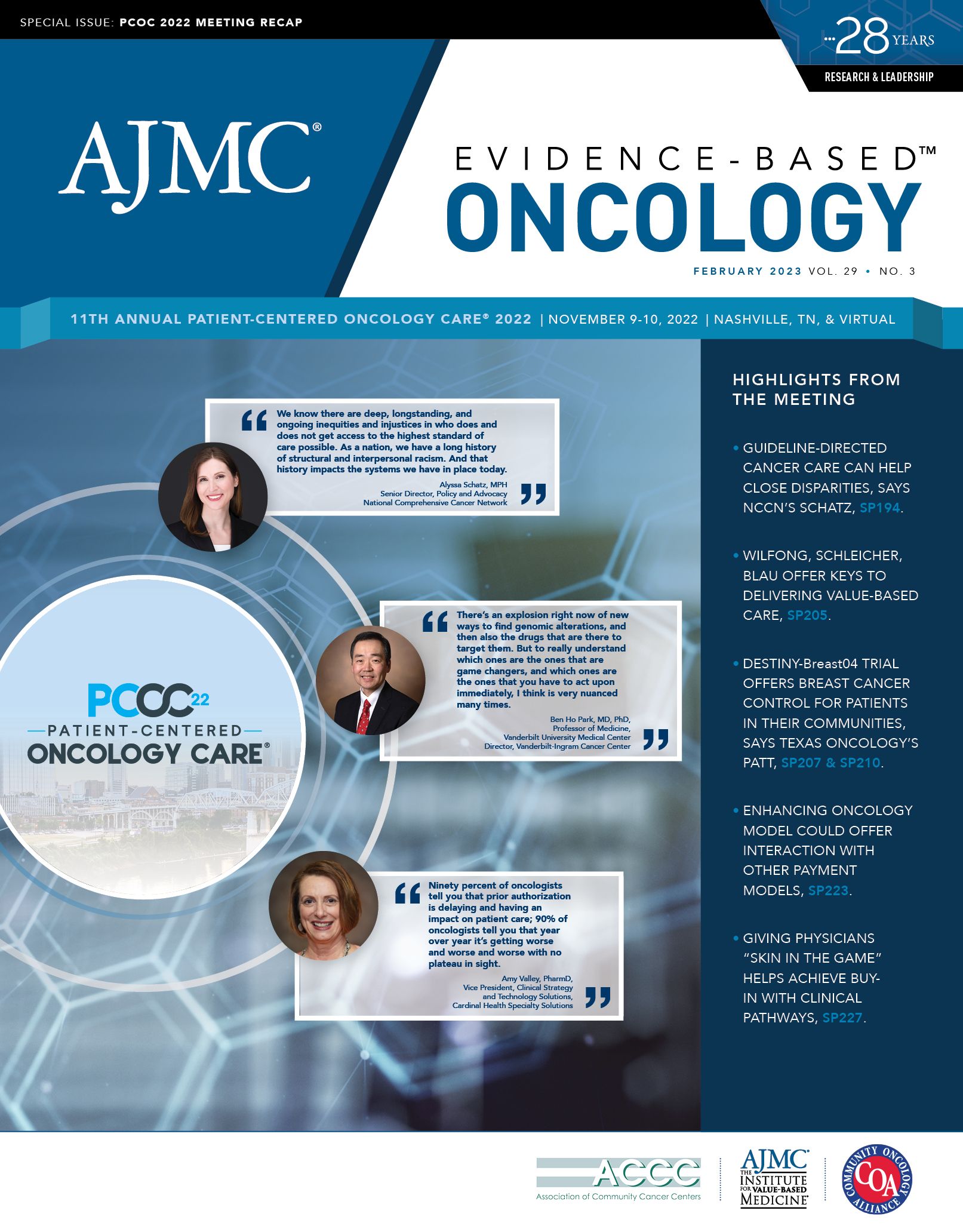- Center on Health Equity & Access
- Clinical
- Health Care Cost
- Health Care Delivery
- Insurance
- Policy
- Technology
- Value-Based Care
Debra Patt, MD, PhD, MBA: DESTINY-Breast04 Realizes a Promise of Modern Cancer Therapy
Note: A previous version of this interview appeared with our meeting coverage.
If oncologists can control patients’ cancer toxicity, patients get to live their lives, and that’s the gift of modern cancer therapy, said Debra Patt, MD, PhD, MBA, executive vice president of public policy and strategic initiatives at Texas Oncology. In this interview with Evidence-Based Oncology (EBO), Patt expands on her keynote address at the 11th Annual Patient-Centered Oncology Care® (PCOC), November 9-10, 2022, in Nashville, Tennessee, where she explained how the DESTINY-Breast04 study findings will impact managed care.1
EBO: What do the DESTINY-Breast04 study findings mean for managed care?
Patt: I’m really excited about some of the new and novel therapies in cancer care. As a community oncologist, not only can we have the goal of either curing or chronically controlling cancer like a chronic disease, but we can do it in people’s communities where, if we can control their toxicity, they get to work at their jobs, they get to sit at their dinner table, pick up their kids from soccer practice, and sleep next to their spouse, they get to live their life. And that’s really the gift of modern cancer therapy. It’s for this reason that I’m super excited about the DESTINY-Breast04 trial [NCT03734029] that talks about trastuzumab deruxtecan in patients with HER2-low advanced breast cancer. About 80% of patients express HER2 low or HER2 amplified and could potentially benefit from HER2 blockade in advanced breast cancer.
What the DESTINY-Breast04 trial studied was in patients with HER2-low expression that, in contrast to chemotherapy, if you give this antibody-drug conjugate trastuzumab deruxtecan, you see both a progression-free and overall survival benefit, whether patients are hormone receptor positive or hormone receptor negative. This is really key [for] our breast cancer patient population, both because it’s effective therapy—the overall response rates are very high, the hazard ratios for progression-free and overall survival are 0.5 and 0.6, so [these are] really meaningful benefits—but also the toxicity is low. So there is some nausea that needs to be managed, some alopecia that can occur, some worrisome toxicities as we evaluate for interstitial lung disease and cardiac dysfunction, but those occur at a low frequency, and if we can monitor for them then we can manage them effectively….
I’m really excited to talk to everyone about it, I think it’s important. There are some particular caveats about the trial that are important for people to know about, especially for payers. Assessing for HER2 low effectively matters. There are guidelines [from the American Society of Clinical Oncology/College of American Pathologists] to evaluate for immunohistochemically positive or low HER2 in addition to fluorescent in situ hybridization.2 Understanding that algorithm and making sure we’re not missing those HER2-low patient populations is really important.
In particular, when we biopsy the bone—because especially with [estrogen receptor] positive breast cancer, it goes to the bone about 80% of the time—when you biopsy the bone, there’s a chemical process of decalcification that can render false negatives for subsequent analysis. So, you need to be able to suspect sometimes when patients might need additional testing, and really think through how to do that. That way you can make sure patients benefit from appropriate therapy.
References
1. Modi S, Jacot W, Yamashita J, et al; DESTINY-Breast04 Trial Investigators. Trastuzumab deruxtecan in previously treated HER2-low advanced breast cancer. N Engl J Med. 2022;387(1):9-20. doi:10.1056/NEJMoa2203690
2. Woo JW, Lee K, Chung YR, Jang MH, Ahn S, Park SY. The updated 2018 American Society of Clinical Oncology/College of American Pathologists guideline on human epidermal growth factor receptor 2 interpretation in breast cancer: comparison with previous guidelines and clinical significance of the proposed in situ hybridization groups. Hum Pathol. 2020;98:10-21. doi:10.1016/j.humpath.2020.01.003

Quality of Life: The Pending Outcome in Idiopathic Pulmonary Fibrosis
February 6th 2026Because evidence gaps in idiopathic pulmonary fibrosis research hinder demonstration of antifibrotic therapies’ impact on patient quality of life (QOL), integrating validated health-related QOL measures into trials is urgently needed.
Read More
Building Trust: Public Priorities for Health Care AI Labeling
January 27th 2026A Michigan-based deliberative study found strong public support for patient-informed artificial intelligence (AI) labeling in health care, emphasizing transparency, privacy, equity, and safety to build trust.
Read More
